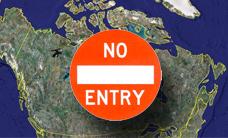Doug Cryer, former director of public policy for the Evangelical Fellowship of Canada, has been appointed to the Immigration and Refugee Board (IRB).
Cryer’s appointment has many people worried because of statements that he made publicly in 2006 on canadianchristianity.com, where he said that the church has a right to say that homosexual behaviour is sinful, just as it can say that adultery is sinful. “It is part of God’s teaching,” he said, though he was also critical of a church that mass-mailed a homophobic pamphlet which included an article titled “The Plague of this 21st Century: The Consequences of the Sin of Homosexuality (AIDS).”
“This kind of brochure helps to reinforce the negative stereotype of Christians,” Cryer said at the time.
During his time at the Evangelical Fellowship, Cryer actively campaigned against same-sex marriage, arguing that it could have a “negative impact on children.”
Cryer is one of two controversial appointments quietly announced last month. The other is Pharès Pierre, the former chief of staff to the Prime Minister of Haiti under the controversial regime of Jean-Bertrand Aristide.
Both are a reflection of the new IRB appointment process which the Minister of Citizenship and Immigration, Jason Kenney, calls “transparent,” though NDP immigration critic Olivia Chow calls it anything but.
“They politicized it,” Chow says. “It is not transparent because the Minister will not tell you — and I have ATIed it — what names are submitted to his desk, and who got rejected and under what criteria of those that qualified are rejected.”
Chow says that when she submitted Access to Information (ATI) requests for the selection criteria, she was given pages of blacked-out notes that were unusable.
As for Cryer, Chow is critical of the appointment.
“He does not have any in-depth experience on any immigration and refugee issues,” Chow says. “From his CV, he has no experience serving on the tribunal or connected with administrating the law, so I can’t see how he would qualify to be an Immigration and Refugee Board member.”
Chow also suggests that Cryer’s appointment is likely because he was a failed Conservative candidate, having run in the 2004 general election as the candidate for Wascana in Saskatchewan, and that he previously served as the legislative assistant to a Conservative MP.
Regarding Cryer’s stated views on homosexuality, Chow worries that if he believes homosexuality is a sin, that perhaps he also believes the sin deserves punishment, and that “perhaps these refugees should be sent back to where they come from, even though they could face torture, humiliation, even sometimes death.”
Alykhan Velshi, spokesman for Kenney, told Sun Media that just because someone opposes same-sex marriage, it doesn’t mean that they oppose refugee status for gays.
“I don’t think that’s good enough,” says Helen Kennedy, executive director of Egale Canada. “When you’re dealing with life or death situations where people are persecuted in their countries of origin, why take the risk? There’s no need to have him there where there’s even a glimmer of a chance that it may impact his decisions. If he has these beliefs — he’s been quoted as saying it’s sinful — there are enough problems with the IRB, we don’t need another one.”
Kennedy hopes that the minister will build on the positive signals he sent regarding gay Iranian refugees, and will pull Cryer from the board.
Liberal immigration critic Maurizio Bevilacqua, says that while he is most concerned that under the Conservatives, infrequent appointments to the IRB created a situation where the backlog doubled and claims processing times and expenses have increased, he trusts that Cryer will follow the rule of law.
“I would be interested in individuals to serve in those positions who have an appreciation for the pluralistic and diverse nature of the country — that’s one of the hallmarks of Canada,” Bevilacqua says. “The decision has been made to appoint him and now what we really need to hope for and be vigilant about is to see decisions that are rendered are consistent with the pluralistic nature of our country, as well as the strong signals that Parliament sent vis-à-vis same-sex marriage.”
The current IRB appointment process is described as merit-based, and it is overseen by a selection advisory board composed of members internal to the IRB, as well as external members jointly appointed by the minister and the IRB chairperson.
Applicants are evaluated against nine competencies that include personal suitability, reliability, open-mindedness, tact and ethics, as well as experience working with diverse communities and exposure to different cultural perspectives, which are verified through reference checks. Once the selection process is completed, the chair forwards the names of successful candidates to the minister for his or her consideration and eventual appointment by a Governor In Council announcement.


 Why you can trust Xtra
Why you can trust Xtra


